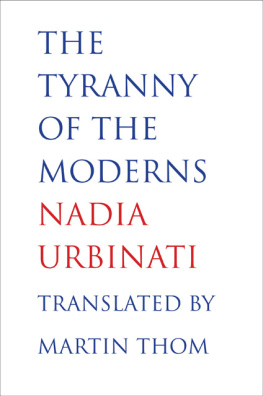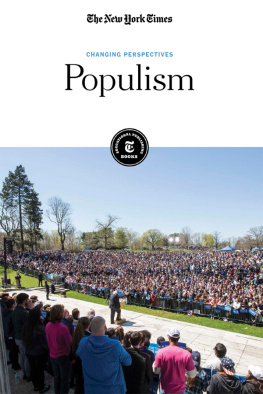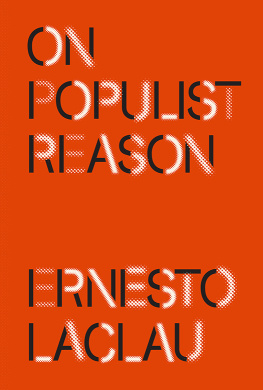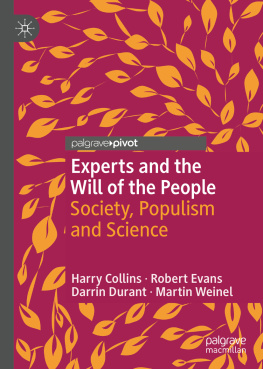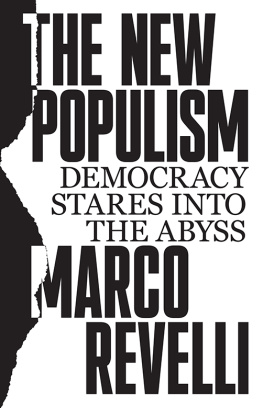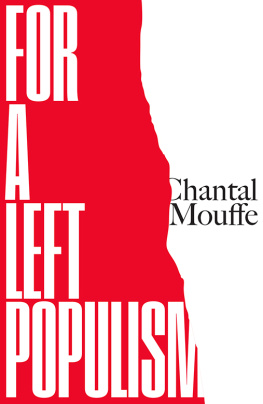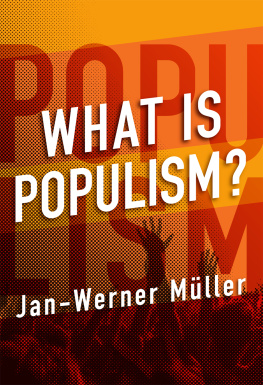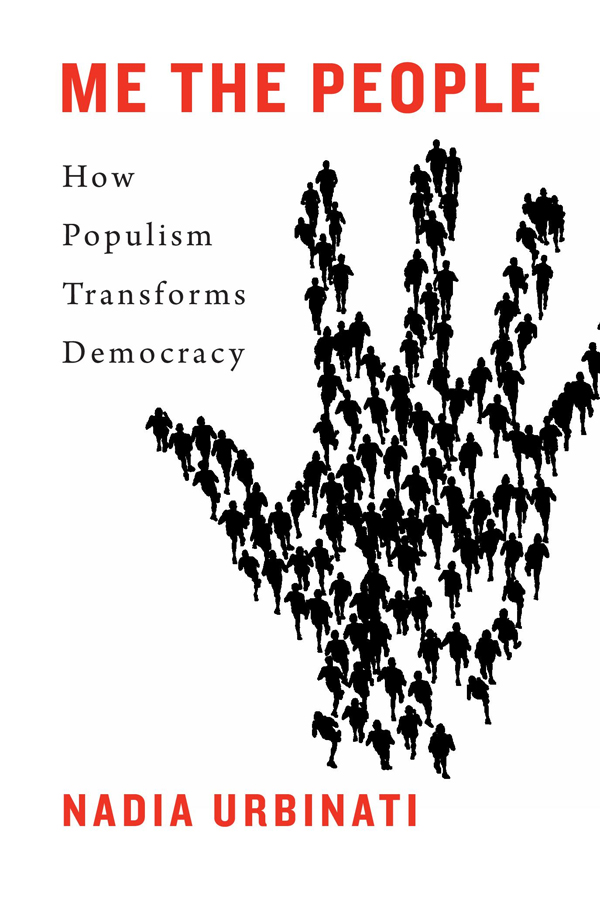Contents
Guide
Pagebreaks of the print version
Me the People
HOW POPULISM TRANSFORMS DEMOCRACY
Nadia Urbinati


CAMBRIDGE, MASSACHUSETTS
LONDON, ENGLAND
2019
Copyright 2019 by the President and Fellows of Harvard College
All rights reserved
Cover art: Ace_Create / DigitalVision Vectors / Getty Images
Cover design: Jill Breitbarth
978-0-674-24088-9 (alk. paper)
978-0-674-24358-3 (EPUB)
978-0-674-24359-0 (MOBI)
978-0-674-24357-6 (PDF)
The Library of Congress has cataloged the printed edition as follows:
Names: Urbinati, Nadia, 1955 author.
Title: Me the people : how populism transforms democracy / Nadia Urbinati.
Description: Cambridge, Massachusetts : Harvard University Press, 2019. | Includes bibliographical references and index.
Identifiers: LCCN 2019005719
Subjects: LCSH: Democracy. | Populism. | Representative government and representation.
Classification: LCC JC423 .U776 2019 | DDC 321.8dc23
LC record available at https://lccn.loc.gov/2019005719
To the memory of my father, after twenty years
CONTENTS
For a democratic system, the process of becoming, of transformation, is its natural state.
N ORBERTO B OBBIO, The Future of Democracy
P OPULISM IS NOT NEW. It emerged along with the process of democratization in the nineteenth century, and since then its forms have mirrored the forms of the representative governments it has challenged. What is novel today is the intensity and pervasiveness of its manifestations: populist movements have appeared in almost every democracy. They now exist from Caracas to Budapest, from Washington to Rome. Any understanding of contemporary politics that wants to be taken seriously must find a way to deal with populism. Yet our ability to study it is currently limited because until recently, this phenomenon was studied in one of two highly specific ways. Either it was simply conceptualized as a subspecies of fascism or it was studied as a form of government that was thought to be limited to the margins of the West, and particularly to Latin American countries.
The fresh interest in populism among scholars and citizens is also something new. Until the end of the twentieth century that interest was strongest among those thinkers who saw populism as a problem connected to the process of national construction in former colonized countries, as a new form of mobilization and contestation against liberal democracy, or as a sign of the renaissance of right-wing parties in Europe.
That was the past. Now, in the twenty-first century, scholars and citizens attracted by populism are more numerous, and their interest in it is primarily political. They conceive of populism not simply as a symptom of fatigue with the establishment and with established parties but also as a legitimate call for power by the ordinary many, who for years have been subjected to declining incomes and political influence. They see it as an opportunity to rejuvenate democracy and as a weapon that the Left might use to defeat the Right (which has traditionally served as the custodian of populist rhetoric and strategy). More important still, they see that populist movements have moved far beyond their erstwhile homeland, Latin America, and have established themselves in government in places as powerful as European Union member-states and the United States.
Despite the growing number of scholars who are sympathetic to populism, and despite the electoral success of populist candidates, the term populism is still used most often as a polemical tool, not an analytic one. It is used as a nom de battaille, to brand and stigmatize political movements and leaders, or as a rallying cry for those who aspire to reclaim the liberal-democratic model from the hands of elites, believing that model is the only valid form of democracy we have. But when populist movements take power, the polemical approach becomes speechless. It cannot explain the uptake of populism within constitutional democracies, which have become the reference point and the target of populist majorities. And this means that it cannot help devise a successful counterpopulist strategy.
My project in this book is to repair this conceptual weakness. I propose that we should abandon the polemical attitude and treat populism as a project of government. I further propose that we should see it as a transformation of the three pillars of modern democracythe people, the principle of majority, and representation. I do not follow the widespread view that populists are mainly oppositional and incapable of governing. In its place, I stress the capacity that populist movements possess to construct a particular regime from within constitutional democracy. Populism in power, I hold, is a new form of representative government, but a disfigured one, situated within the category of disfigurement I devised in my previous book.
This Introduction has four parts, which set up the conceptual environment for the theory I develop in the rest of the work. First, I propose an outline of the constitutional and representative democratic context in which populism is now developing, and in relation to which it must be judged. Second, I argue that populism can be understood as a global trend, with a recognizable phenomenological pattern, but that every particular instance of populism retains local-context-specific features. Third, I offer a synthetic and critical overview of the main contemporary interpretations of populism, in relation to which I develop my theory. Finally, I provide a brief road map of the chapters ahead.
How Populism Transforms Representative Democracy
This book seeks to understand the implications of populisms reappearance in relation to constitutional democracy. Constitutional democracy is the political order that promises to protect basic rights (which are essential to the democratic process) by limiting the power of the majority in government, by providing stable and regular opportunities for changing majorities and governments, by guaranteeing social and procedural mechanisms that permit the largest possible part of the population to participate in the game of politics, and by influencing decisions and changing who makes decisions. It does this through the separation of powers and the independence of the judiciary. Stabilized after 1945 with the defeat of mass dictatorships, constitutional democracy was meant to neutralize the problems that populism is now trying to capitalize on.
Let me try to summarize the theory I will put forth. I argue that populist democracy is the name of a new form of representative government that is based on two phenomena: a direct relation between the leader and those in society whom the leader defines as the right or good people; and the superlative authority of the audience. Its immediate targets are the obstacles to the development of those phenomena: intermediary opinion-making bodies, such as parties; established media; and institutionalized systems for monitoring and controlling political power. The result of these positive and negative actions delineates the physiognomy of populism as an interpretation of the people and the majority that is tainted by an undisguisedindeed, an enthusiastic


